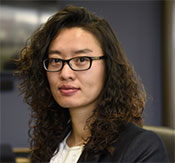Upcoming Webinar & Open Access Article: Dr. Danfeng Yao, 18 September 2019

Upcoming Webinar and Open Access Article: 18 September 2019
Webinar Topic: "Data Breaches and Multiple Points to Stop Them"
Presented by Dr. Danfeng (Daphne) Yao and based on the open access article:
"Privacy-Preserving Detection of Sensitive Data Exposure,”published in IEEE Trans. Information Forensics and Security"
| Speaker: Dr. Danfeng (Daphne) Yao Original article is open access and available for download now |
Date: 18 September 2019 Time: 11:00 am EDT (New York time) Duration: Approximately 1 hour Register: Attendee Registration |
About this Topic:
This webinar, “Data Breaches and Multiple Points to Stop Them,” will discuss how preventing unauthorized access to sensitive data might appear to be an unattainable goal. Our presenter will break down the data breach problem and give insights into what organizations could and should do to reduce their risks. The talk will start with discussing the technical reasons behind some of the recent high-profile data breach incidents (including Equifax and Target), as well as pointing out the threats of inadvertent or accidental data leaks. Then, she will show that there are usually multiple points to stop a data breach and gives an overview of the relevant best-practices and state-of-the-art solutions, including recent algorithmic advances in set-based and alignment-based screening techniques, outsourced screening, and GPU-based performance acceleration.
Dr. Yao will discuss the roles of regulations, e.g., Data Security Standard (DSS) from the Payment Card Industry (PCI), and non-technical factors, such as organizational culture, in data security. Because of the cat-and-mouse nature of cybersecurity, achieving absolute data security is impossible. However, proactively securing critical data paths through strategic planning and placement of security tools help reduce the risks. Dr. Yao will also explain what researchers can do to contribute in this space.
About the Speaker:

Dr. Danfeng (Daphne) Yao is a Professor of Computer Science at Virginia Tech, Blacksburg. She received the Ph.D. degree from Brown University, the M.S. degrees from Princeton University and Indiana University, Bloomington, and the B.S. degree from Peking University in China.
She creates new models, algorithms, techniques, and deployment-quality tools that can be used for vulnerability screening of complex real-world software and for anomaly detection in general purpose computer systems and networks. She systematized program-anomaly detection in the 2017 book: Anomaly Detection as a Service: Challenges, Advances, and Opportunities. She holds two U.S. patents for her inventions on network causal analysis for forensics in 2010 and 2018. Her interests are on software and system security, data analytics for security, and deep learning.
Dr. Yao was named an ACM Distinguished Scientist for her outstanding scientific contributions to cybersecurity. She received the NSF CAREER Award for her work on human-behavior-driven malware detection and the ARO Young Investigator Award for her semantic reasoning for mission-oriented security work. Dr. Yao has several Best Paper Awards and Best Poster Awards and is currently the ACM SIGSAC Treasurer/Secretary, a member of the SIGSAC executive committee, and a senior member of the IEEE.

